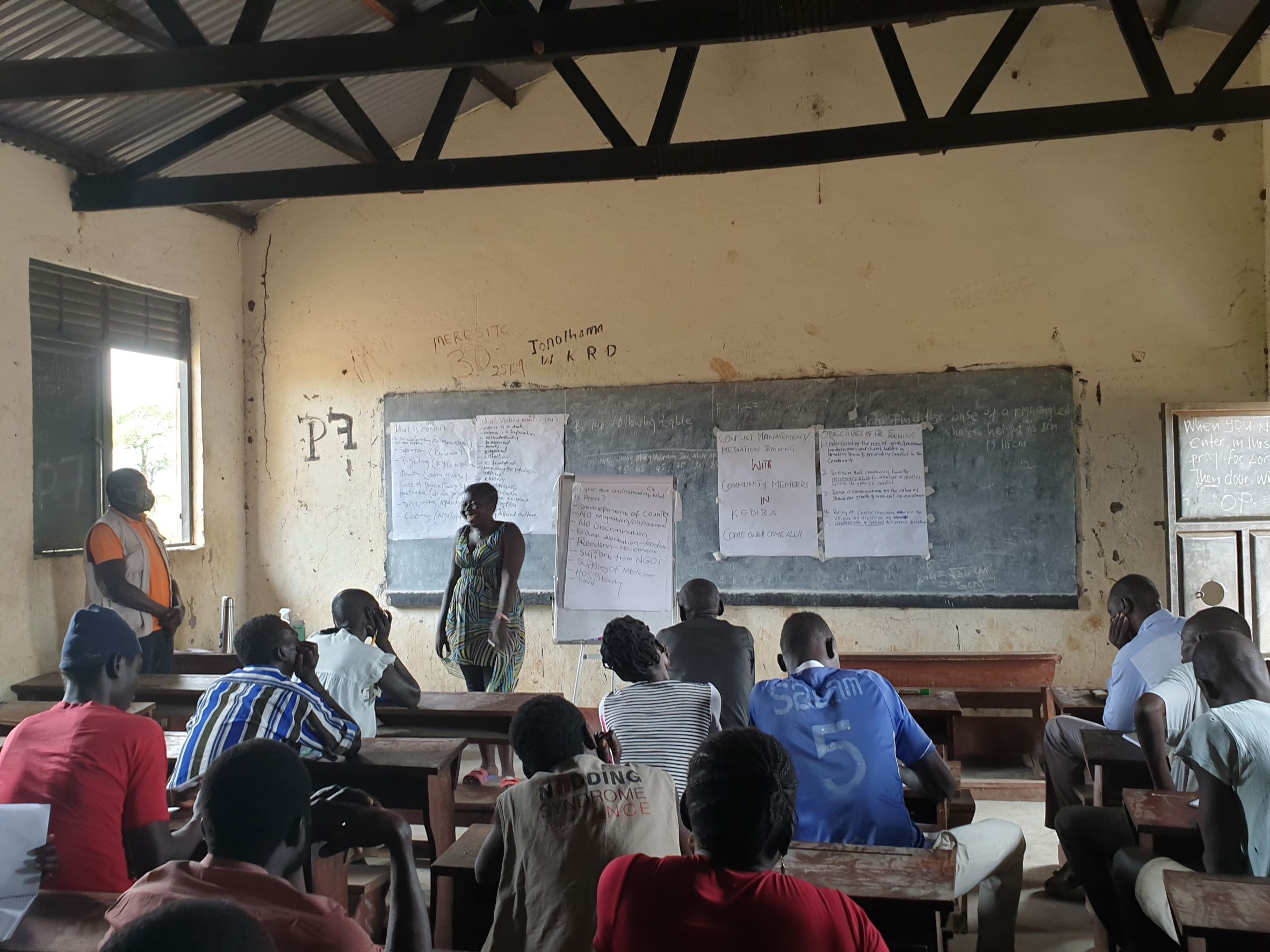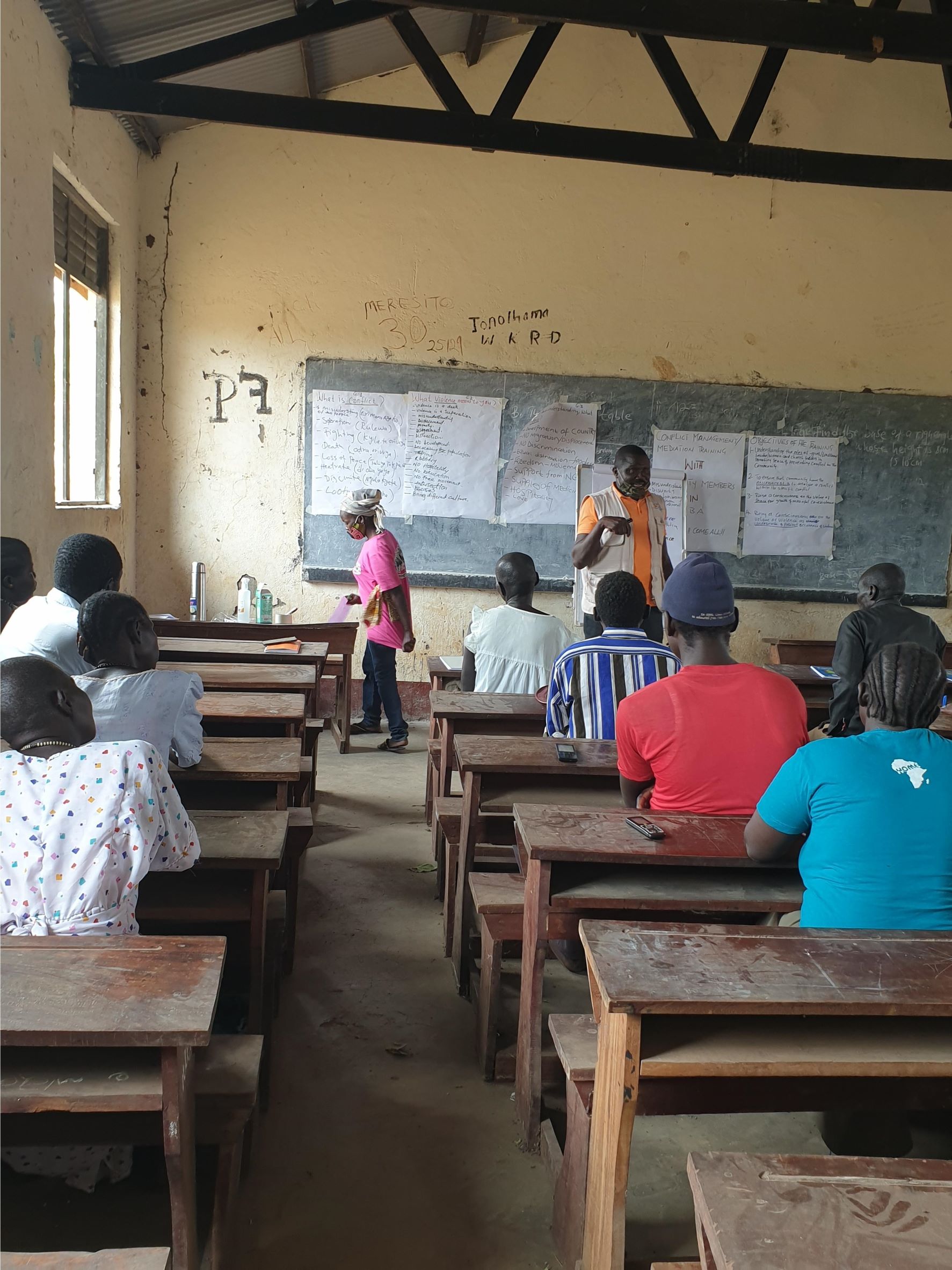Everyday Bravery: A Commitment to Change
By Tasneem Kalla, International Protection Officer with NP in South Sudan
 Conflict Management training with local community leaders, Kediba, Mundri East
Conflict Management training with local community leaders, Kediba, Mundri East
(Tasneem & Chief not pictured)
Earlier this year, the Nonviolent Peaceforce (NP) team in Mundri had a routine community check-in with the village of Okari. As Protection Teams, we do these sorts of check-ins often. It's how we remain connected to communities, build trust, and identify ways to continue supporting them (through training, awareness-raising, or advocating on their behalf). This check-in was different though. It was the first time I had come across a female Chief during my time in South Sudan.
Cultures in the Western Equatorial region are still predominantly patriarchal. Although not as conservative as many other regions, gender roles inform the leadership landscape and these spaces are still male-dominated. Listening to this fiery, passionate Chief tell us about the challenges her community faces and what she has done to address conflict and maintain peace was, for lack of a better word—energizing. I could not stop smiling. Initially, my excitement confused her; we were there to discuss serious protection concerns. Once the team explained my excitement to her, she had a good-natured laugh at me, gave me a mango for later, and then sat down to talk to us.
Okari, the Chief’s village, is a small Boma (village) just outside Mundri Payam. The NP team has a comfortable presence in the area, the community is familiar with the NP team from the general community check-ins and numerous awareness-raising and training sessions that have been conducted. But unlike most towns, Okari consists of an army barrack, civilian community, and a market—all within a short walking distance from each other. Given the current political climate and the history, the coexistence of a civilian community and an army barrack as very close neighbours can yield various outcomes.
The Chief of Okari knows this and ensures that her community remains on good terms with the barrack. She has taken on the responsibility of protecting the civilians in her community by investing in community efforts to maintain good relations and avoid tension with their military neighbours.
But even small actions can spark conflict.
A few days before, a five-year-old child in a small village had dropped a piece of lit charcoal while trying to help his mother light their coal stove. The fire started quickly, between the straw tukuls and dry season, it spread fast and destroyed seven tukuls in the barrack. The families who owned these tukuls lost their possessions, money, and food. Though the child and his family are part of the neighbouring civilian community, the fire happened at the barrack and soldiers responded by detaining and beating the father of the child, explained the Chief.
She told us that once she heard about this, she approached the soldiers and told them that it wasn’t their job to detain a civilian. It's the job of the police to understand what happened and decide if he should be arrested or not. It is not up to the soldiers to take matters into their own hands, she explained. She demanded his release, but was ignored by the soldiers even after warning them that she intended to escalate the situation to Mundri Payam because it was unjust.
The events that transpired are, in my opinion, indisputably brave. The Chief approached the Commander in Mundri and reported the incident. She explained what had occurred, why she thought it was unjust and asked that the father be released. The Commander responded by holding a trial for the individual in question. The outcome? The father was immediately released, but the Commander didn't stop there and proceeded to address the issue with the 2nd in command and soldiers in attendance from Okari.
I had this eureka moment, ‘everyday bravery’, I was finally able to translate what I was feeling and witnessing into words.
 Conflict Management training with local community leaders, Kediba, Mundri East
Conflict Management training with local community leaders, Kediba, Mundri East
(Tasneem & Chief not pictured)
The Commander agreed with the Chief - the soldiers had no right to detain the man, it was not their job. He also called them out on not creating fire breaks around the barrack as they should have. Mostly, he reiterated that armed soldiers should not be harassing civilians under any circumstances.
To some, this may seem insignificant or a small success. I disagree, it was saving the life of a father and protecting a community from the blatant abuse of power that has become so normal. It was standing up to authority figures and demanding justice - knowing that the outcome was uncertain and could have gone the other way.
"Afterwards, we held a community meeting to discuss how to decrease the tension with the barrack," said the Chief. Despite what happened, they needed to address the hostilities between the community and the barrack immediately, before it escalates, she explained. The community of Okari does not have much, but they decided to pool together to try and raise the money that was lost in the fire. They also gathered any foods and grains they could spare for the families who lost their tukuls.
This was not the first time that the Chief of Okari had rallied her community to ensure good relations with their neighbours. She told us that it was more important to make sure there was no animosity between the community and the barrack than to be upset about what had happened. Since then, the neighbours have resumed their relatively peaceful coexistence, and the Chief continues to ensure that the community does their part in maintaining it.
And it is not just the Chief. I have witnessed acts of everyday bravery often since arriving in South Sudan. The women I have had the privilege of engaging with have taught me that change happens at every level and that every achievement is a success. From the Women Protection Teams (WPT) we work with to the young girls, mothers, and women in communities – I am constantly reminded of the immense strength, resilience and commitment to change shown by acts of everyday bravery.
The acts of bravery and the strength I have witnessed are both intimidating and inspiring. I have the privilege of spending my days in the company of women who never stop working on breaking the cycles of trauma by encouraging and creating long-lasting peace. When you connect with people on this level and are given an insight into their lived experiences - it becomes personal. I love seeing how communities respond to NP, the trust NP inspires, and the faith they have in NP to have their best interests at heart. It is a testament to years of relationship building. And at the centre of this is NPs commitment to civilian protection and working alongside communities to create long-lasting peace.
